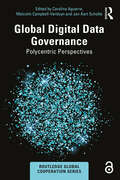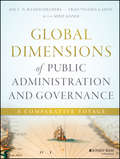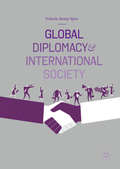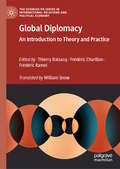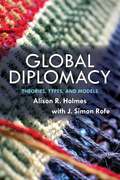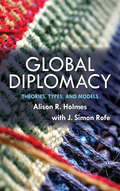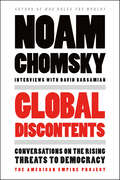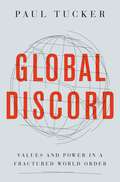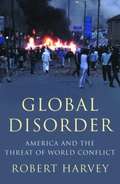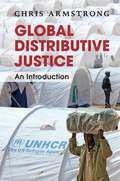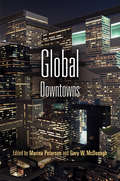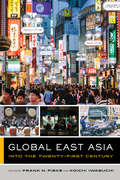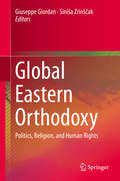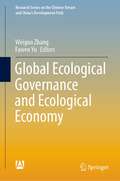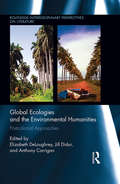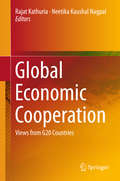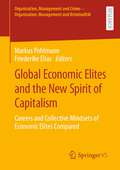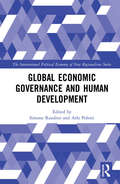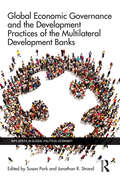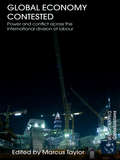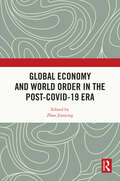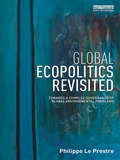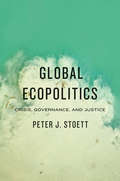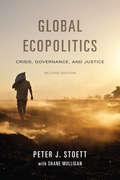- Table View
- List View
Global Digital Data Governance: Polycentric Perspectives (Routledge Global Cooperation Series)
by Jan Aart Scholte Malcolm Campbell-Verduyn Carolina AguerreThis book provides a nuanced exploration of contemporary digital data governance, highlighting the importance of cooperation across sectors and disciplines in order to adapt to a rapidly evolving technological landscape. Most of the theory around global digital data governance remains scattered and focused on specific actors, norms, processes, or disciplinary approaches. This book argues for a polycentric approach, allowing readers to consider the issue across multiple disciplines and scales. Polycentrism, this book argues, provides a set of lenses that tie together the variety of actors, issues, and processes intertwined in digital data governance at subnational, national, regional, and global levels. Firstly, this approach uncovers the complex array of power centers and connections in digital data governance. Secondly, polycentric perspectives bridge disciplinary divides, challenging assumptions and drawing together a growing range of insights about the complexities of digital data governance. Bringing together a wide range of case studies, this book draws out key insights and policy recommendations for how digital data governance occurs and how it might occur differently. Written by an international and interdisciplinary team, this book will be of interest to students and scholars in the field of development studies, political science, international relations, global studies, science and technology studies, sociology, and media and communication studies.
Global Dimensions of Public Administration and Governance
by Eran Vigoda-Gadot Jos RaadscheldersA comparative, interdisciplinary examination of the mechanismsbehind public administration Global Dimensions of Public Administration and Governanceis a comprehensive, comparative text on the structure and functionof governments around the world. Written by two of the field'sleading public administration scholars, this book provides aninterdisciplinary perspective and a global, historical, andtheoretical examination of the management and governance of themodern state. Readers learn how territory, bureaucracy, andpolitical systems influence policy and reform in over thirtycountries, and how these mechanisms affect the everyday lives ofcitizens. This comparative approach features rich examples of howpolicy is shaped by culture, and how modern policy principles arefiltered to fit a country's needs and expectations. Chaptersconclude with comparative analyses that help readersbetter-understand the role and position of government in thecontemporary world, both in democratic societies andless-than-democratic environments.Governance doesn't happen in a vacuum. Those responsible forpolicy, regulation, and reform take cues from history, currentevents, and visions for the future to inform thinking on mattersthat can potentially affect a large number of everyday lives. Thisbook illustrates the thought process, providing the necessaryinsight these important decisions require.Understand the relationship between structure and function ofgovernmentLearn how policy is culture-dependentExamine the political and societal contexts of reformDiscover the myriad forms of modern bureaucracyThe various social sciences provide valuable information andperspectives for those involved in public administration. Thoseperspectives converge here to form a thorough, well-rounded,examination of the success and failure possible, and the mechanismsthrough which they take place. Global Dimensions of PublicAdministration and Governance provides a detailed, wide-ranginglook at how modern governments operate, how they got this far, andwhere they're headed for the future.
Global Diplomacy and International Society
by Yolanda Kemp SpiesThis book is a comprehensive overview of the theory, history, law, institutional framework and culture of global diplomacy. It reflects on the key existential challenges to the institution and addresses aspects that are often overlooked in diplomatic studies: inter alia diplomatic law, development-driven diplomacy and the bureaucracy of diplomatic practice. All chapters are extensively illustrated with recent case examples from across the world. Special emphasis is placed on incorporating perspectives from Africa and other developing regions in the Global South, so as to balance the Eurocentrism of traditional diplomatic literature.
Global Diplomacy: An Introduction to Theory and Practice (The Sciences Po Series in International Relations and Political Economy)
by Frédéric Ramel Thierry Balzacq Frédéric CharillonThis volume brings together different approaches to diplomacy both as an institution and a practice. The authors examine diplomacy from their own backgrounds and through sociological traditions, which shape the study of international relations (IR) in Francophone countries. The volume’s global character articulates the Francophone intellectual concerns with a variety of scholarships on diplomacy, providing a first contact with this subfield of IR for students and practitioners.
Global Diplomacy: Theories, Types, and Models
by Alison R. Holmes J. Simon RofeIn a field dominated by the history and practices of Western states, Global Diplomacy expands the mainstream discourse on diplomacy to include non-Western states and states in all stages of development. By presenting a broader view of this crucial institution, this exciting text cultivates a more global understanding of the ways in which diplomacy is conducted in the world today and offers a new perspective on the ways it may continue to develop in the future.
Global Diplomacy: Theories, Types, and Models (Studies In Conflict, Diplomacy, And Peace Ser.)
by Alison R. HolmesIn a field dominated by the history and practices of Western states, Global Diplomacy expands the mainstream discourse on diplomacy to include non-Western states and states in all stages of development. By presenting a broader view of this crucial institution, this exciting text cultivates a more global understanding of the ways in which diplomacy is conducted in the world today and offers a new perspective on the ways it may continue to develop in the future. This book presents; a brief introduction to diplomatic practice, the classic diplomatic narrative, and different theories of diplomacy; an exploration of diplomacy over time and place through four types of diplomacy-political, cultural, economic, and military-discussed by guest authors who are experts in their respective fields; three new models of diplomatic interaction-Community, Transatlantic, and Relational-illustrated through the examples of the European Union, UK and US relations, and the rising powers of India and China.
Global Discontents: Conversations on the Rising Threats to Democracy (The American Empire Project)
by Noam Chomsky David BarsamianIn this compelling set of interviews, the intellectual discusses contemporary threats to democracy, from economic inequality to the Trump presidency.In wide-ranging discussions with David Barsamian, his longtime interlocutor, Noam Chomsky asks us to consider “the world we are leaving to our grandchildren”: one imperiled by climate change and the growing potential for nuclear war. If the current system is incapable of dealing with these threats, he argues, it’s up to us to radically change it.The twelve interviews in Global Discontents examine the recent global developments: the rise of ISIS, the reach of state surveillance, growing anger over economic inequality, conflicts in the Middle East, and the presidency of Donald Trump. In personal reflections on his Philadelphia childhood, Chomsky also describes his own intellectual journey and the development of his uncompromising stance as America’s premier dissident intellectual.“Well-informed salvos to please or enrage, depending on one’s politics.” —Kirkus Reviews
Global Discord: Values and Power in a Fractured World Order
by Paul TuckerHow to sustain an international system of cooperation in the midst of geopolitical struggleCan the international economic and legal system survive today’s fractured geopolitics? Democracies are facing a drawn-out contest with authoritarian states that is entangling much of public policy with global security issues. In Global Discord, Paul Tucker lays out principles for a sustainable system of international cooperation, showing how democracies can deal with China and other illiberal states without sacrificing their deepest political values. Drawing on three decades as a central banker and regulator, Tucker applies these principles to the international monetary order, including the role of the U.S. dollar, trade and investment regimes, and the financial system.Combining history, economics, and political and legal philosophy, Tucker offers a new account of international relations. Rejecting intellectual traditions that go back to Hobbes, Kant, and Grotius, and deploying instead ideas from David Hume, Bernard Williams, and modern mechanism-design economists, Tucker describes a new kind of political realism that emphasizes power and interests without sidelining morality. Incentives must be aligned with values if institutions are to endure. The connecting tissue for a system of international cooperation, he writes, should be legitimacy, creating a world of concentric circles in which we cooperate more with those with whom we share the most and whom we fear the least.
Global Discord: Values and Power in a Fractured World Order
by Paul TuckerHow to sustain an international system of cooperation in the midst of geopolitical struggleCan the international economic and legal system survive today’s fractured geopolitics? Democracies are facing a drawn-out contest with authoritarian states that is entangling much of public policy with global security issues. In Global Discord, Paul Tucker lays out principles for a sustainable system of international cooperation, showing how democracies can deal with China and other illiberal states without sacrificing their deepest political values. Drawing on three decades as a central banker and regulator, Tucker applies these principles to the international monetary order, including the role of the U.S. dollar, trade and investment regimes, and the financial system.Combining history, economics, and political and legal philosophy, Tucker offers a new account of international relations. Rejecting intellectual traditions that go back to Hobbes, Kant, and Grotius, and deploying instead ideas from David Hume, Bernard Williams, and modern mechanism-design economists, Tucker describes a new kind of political realism that emphasizes power and interests without sidelining morality. Incentives must be aligned with values if institutions are to endure. The connecting tissue for a system of international cooperation, he writes, should be legitimacy, creating a world of concentric circles in which we cooperate more with those with whom we share the most and whom we fear the least.
Global Disorder: America and the Threat of World Conflict
by Robert HarveyRecent financial history of the US
Global Distributive Justice
by Chris ArmstrongGlobal distributive justice is now part of mainstream political debate. It incorporates issues that are now a familiar feature of the political landscape, such as global poverty, trade justice, aid to the developing world and debt cancellation. This is the first textbook to focus exclusively on issues of distributive justice on the global scale. It gives clear and up-to-date accounts of the major theories of global justice and spells out their significance for a series of important political issues, including climate change, international trade, human rights and migration. These issues are brought to life through the use of case studies, which emphasise the connection of theories of justice to contemporary politics, and 'Further Issues' sections, which discuss emerging debates or controversies that are likely to command increasing attention in the coming years.
Global Downtowns
by Marina Peterson Gary McdonoghGlobal Downtowns reconsiders one of the defining features of urban life--the energy and exuberance that characterize downtown areas--within a framework of contemporary globalization and change. It analyzes the iconic centers of global cities through individual case studies from Europe, Asia, Africa, Latin America, and the United States, considering issues of function, population, imagery, and growth. Contributors to the volume use ethnographic and cultural analysis to identify downtowns as products of the activities of planners, power elites, and consumers and as zones of conflict and competition. Whether claiming space on a world stage through architecture, media events, or historical tourism or facing the claims of different social groups for a place at the center, downtowns embody the heritage of the modern city and its future.Essays draw on extensive fieldwork and archival study in Beijing, Barcelona, New York, Los Angeles, Chicago, Dar es Salaam, Dubai, Nashville, Lima, Philadelphia, Mumbai, Havana, Beirut, and Paris, among other cities. They examine the visions of planners and developers, cultural producers, governments, theoreticians, immigrants, and outcasts. Through these perspectives, the book explores questions of space and place, consumption, mediation, and images as well as the processes by which urban elites learn from each other as well as contest local hegemony.Global Downtowns raises important questions for those who work with issues of urban centrality in governance, planning, investment, preservation, and social reform. The volume insists that however important the narratives of individual spaces--theories of American downtowns, images of global souks, or diasporic formations of ethnic enclaves as interconnected nodes--they also must be situated within a larger, dynamic framework of downtowns as centers of modern urban imagination.
Global East Asia: Into the Twenty-First Century (The Global Square #4)
by Edited by Frank N. Pieke and Koichi IwabuchiHome to a rapidly rising superpower and the two largest economies in the world after the US, a global East Asia is seen and felt everywhere. This dynamic text views the global square from the perspective of the world’s most important rising global center. East Asia’s global impact is built on a dizzying combination: a strong and deep civilizational self-consciousness fused with hypermodernity, wealth, influence, and power, which have made the region a beacon for the world and an alternative to the West. Short, accessible essays by prominent experts on the region cover the core of East Asian—Japan, China, and Korea—as well as Mongolia and Taiwan. Topics include contemporary culture, artistic production, food, science, economic development, digital issues, education and research, and international collaboration. Students will glean new perspectives about the region using the insights of global studies.
Global Eastern Orthodoxy: Politics, Religion, and Human Rights
by Giuseppe Giordan Siniša ZrinščakThis volume highlights three intertwined aspects of the global context of Orthodox Christianity: religion, politics, and human rights. The chapters in Part I address the challenges of modern human rights discourse to Orthodox Christianity and examine conditions for active presence of Orthodox churches in the public sphere of plural societies. It suggests theoretical and empirical considerations about the relationship between politics and Orthodoxy by exploring topics such as globalization, participatory democracy, and the linkage of religious and political discourses in Russia, Greece, Belarus, Romania, and Cyprus. Part II looks at the issues of diaspora and identity in global Orthodoxy, presenting cases from Switzerland, America, Italy, and Germany. In doing so, the book ties in with the growing interest resulting from the novelty of socio-political, economic, and cultural changes which have forced religious groups and organizations to revise and redesign their own institutional structures, practices, and agendas.
Global Ecological Governance and Ecological Economy (Research Series on the Chinese Dream and China’s Development Path)
by Fawen Yu Weiguo ZhangThis book focuses on ecological economics conducted in the context of global ecological governance, covering topics from ecological footprint, energy saving and emission reduction, circular economy, green development, sustainable development, ecological civilization, to the ecological environment and ecological governance of rural areas, etc. as well as some theoretical studies related to efficient ecological economics. It is contributed by scholars attending the high-level forum with the theme of “Global Ecological Governance and Ecological Economic Studies” hosted by the Chinese Ecological Economics Society (CEES), the first ecological economics society in the world, and many cutting-edge concepts in the field of ecological economics are proposed. It provides some insight for scholars who are interested in the field of global ecological governance and ecological economic studies.
Global Ecologies and the Environmental Humanities: Postcolonial Approaches (Routledge Interdisciplinary Perspectives on Literature)
by Edited by Elizabeth DeLoughrey, Jill Didur, and Anthony CarriganThis book examines current trends in scholarly thinking about the new field of the Environmental Humanities, focusing in particular on how the history of globalization and imperialism represents a special challenge to the representation of environmental issues. Essays in this path-breaking collection examine the role that narrative, visual, and aesthetic forms can play in drawing attention to and shaping our ideas about long-term and catastrophic environmental challenges such as climate change, militarism, deforestation, the pollution and management of the global commons, petrocapitalism, and the commodification of nature. The volume presents a postcolonial approach to the environmental humanities, especially in conjunction with current thinking in areas such as political ecology and environmental justice. Spanning regions such as Africa, Asia, Eastern Europe, Latin America and the Caribbean, Australasia and the Pacific, as well as North America, the volume includes essays by founding figures in the field as well as new scholars, providing vital new interdisciplinary perspectives on: the politics of the earth; disaster, vulnerability, and resilience; political ecologies and environmental justice; world ecologies; and the Anthropocene. In engaging critical ecologies, the volume poses a postcolonial environmental humanities for the twenty-first century. At the heart of this is a conviction that a thoroughly global, postcolonial, and comparative approach is essential to defining the emergent field of the environmental humanities, and that this field has much to offer in understanding critical issues surrounding the creation of alternative ecological futures.
Global Economic Cooperation
by Rajat Kathuria Neetika Kaushal NagpalThis book discusses issues such as global financial crisis and global governance, food security, energy sustainability, the global financial system, trade and protectionism, and growth and employment. Since the outbreak of the financial as well as national debt crises in the Euro zone, the focus of the G20 has shifted back to addressing short-term issues. These issues range from the dynamic effects of global imbalances and the appropriate degree of financial sector regulation to questions of austerity versus growth and the lack of a comprehensive framework for managing the international monetary system. A further issue is the relevance of the G20 agenda for emerging market economies. Global economic recovery still remains fragile and downside risks to global growth remain. Additionally, much of the agenda of the Seoul Development Consensus for shared growth launched in 2010 has yet to be fulfilled. A key discussion point in the book, therefore, is how to make a tangible and significant difference in peoples' lives by implementing an agenda of inclusive growth.
Global Economic Elites and the New Spirit of Capitalism: Careers and Collective Mindsets of Economic Elites Compared (Organization, Management and Crime - Organisation, Management und Kriminalität)
by Markus Pohlmann Friederike EliasIs a new spirit of capitalism emerging as a result of neoliberal adjustments in the global economy? The internationalization of management and its comprehensive neoliberals imprint fall short of the assumptions represented by globalization theory. Empirical data on the life trajectories and action orientations of CEOs from leading industrial companies in nine countries across Europe, Asia, and Latin America indicate that local institutional frameworks, diverse regional challenges, and historically embedded cultural influences exert more significant influence than global trends. Different strategies and structures have been identified based on problem-centered interviews with top executives, and they are made accessible for the first time in English for comparative purposes.
Global Economic Governance and Human Development (The International Political Economy of New Regionalisms Series)
by Simone Raudino Arlo PolettiTraditional understandings of economic development in low- and mid-income countries have largely been influenced by the economic narrative of Western Official Development Assistance (ODA). Within this framework, compliance with macroeconomic orthodoxy and early integration in Global Economic Governance (GEG) regimes are presented as enabling conditions to reach enhanced and sustainable levels of economic growth and social betterment. Yet, this narrative often fails to answer fundamental questions surrounding relational dynamics between the economies of ODA beneficiary countries and the GEG regimes they are asked to join. Bringing together contributions by Government officials, academics and development practitioners, this edited volume explores quantitative and qualitative approaches to socio-economic analysis in low- and mid-income countries, highlighting the conditions under which international economic policies and institutions can foster – or hinder – their socio-economic growth. In particular, contributions address the impact of both West and China-inspired international economic regimes on value-adding capacity, trade, investments, job creation and social development, thus advancing the debate on what policy and legal provisions should low- and mid-income countries adopt in order to maximize the benefits and minimize the costs deriving from joining international economic regimes. A comprehensive investigation of both sides of the Global Economic Governance and Human Development relationship; this book will interest scholars, practitioners and graduate students working in the areas of international relations, international political economy, global governance, international economics, development studies and human security.
Global Economic Governance and the Development Practices of the Multilateral Development Banks (Ripe Series In Global Political Economy Ser.)
by Susan Park Jonathan R. StrandAs pillars of the post-1945 international economic system the Regional and Sub-Regional Development Banks (RSDBs) have long been considered mini-World Banks, reiterating the policy approach of the largest official multilateral development lender in the world. The main objective of the collection is to identify what role the RSDBs play in global economic governance and why. This edited collection draws together cutting edge original research on these understudied institutions. In the burgeoning sub-field of global economic governance as well as the broader study of international organisations (IOs), too often the focus remains on the World Bank and the International Monetary Fund (IMF). Second-order IOs, such as the RSDBs, receive much less attention despite their longevity and regional importance. This volume corrects this oversight by bringing together methodologically diverse research on the RSDBs that interrogates the role and impact of these organisations in global economic governance. The book investigates: the African Development Bank (AfDB); the Asian Development Bank (AsDB); the Inter-American Development Bank (IDB), and the European Bank for Reconstruction and Development (EBRD) and select sub-regional development banks in comparison to the World Bank Group. This work will be of great interest to students and scholars of IPE, IR and Development Studies.
Global Economy Contested: Power and Conflict across the International Division of Labour (Rethinking Globalizations Ser. #Vol. 14)
by Marcus TaylorAlthough much has been written on the topic of economic globalization, few volumes examine the social foundations of the global economy in a way that puts power and contestation at the forefront of the analysis. This book addresses this gap by emphasizing the contested social processes that underpin global production chains and financial structures
Global Economy and World Order in the Post-COVID-19 Era
by Zhao JianyingThis volume is jointly written by twenty experts and scholars from China. It aims to reflect and answer at least two kinds of questions from historical experience and academic perspective. First, how to view the world in the post-pandemic era? Second, how to view China in the post-pandemic era? From the perspective of macroeconomics and international relations, the book discusses in detail the trend of economic globalization, the risk of global economic recession, the industrial chain affected by the COVID-19 pandemic, the world order in the post-pandemic era, global governance, and relations between and among major world powers. This book presents Chinese scholars' in-depth and timely reflections on the international pattern of the post-pandemic era. It will be a great read for students and scholars of international relations, East Asian studies, and those interested in the world economy in general.
Global Ecopolitics Revisited: Towards a complex governance of global environmental problems
by Philippe Le PrestreFaced with worsening environmental indicators, cooperation hurdles, and the limited effectiveness of current institutions, reforming international environmental governance has proven elusive, despite various diplomatic initiatives at the United Nations level over the last two decades. Overcoming the current dead end, however, may rest less in devising new arrangements than in challenging how the problem has been approached. Presenting a multifaceted exploration of some of the key issues and questions in global ecopolitics, this book brings together recent advances in research on global environmental governance in order to identify new avenues of inquiry and action. Each chapter questions elements of the current wisdom and covers a topic that lies at the heart of global environmental governance, including the reasons for engagement, the evolving relationship between science and policy, the potential and limits of the European Union as a key actor, the role of developing and emergent countries, and the contours of a complex governance of international environmental issues. Laying the foundation for rethinking at a time of great transformation in global ecopolitics, this book will be important reading for students of environmental politics and governance. It will also be of relevance to policy makers with an interest in going beyond the prevailing discourse on this crucial topic.
Global Ecopolitics: Crisis, Governance, And Justice
by Peter StoettDespite sporadic news coverage of extreme weather, international conventions on climate change, or special UN days, rarely do we participate in a sustained analysis of environmental policy making. To remedy this shortcoming and to propel the discussion forward, Peter J. Stoett provides a concise introduction to environmental governance. Through seven case studies, Stoett analyzes the ability of international policy to provide environmental protection and discusses the ever-present factors of equality, sovereignty, and human rights integral to these issues. While providing a panoramic view of the actors and structures producing these policies, Stoett reminds readers that the topic is personal, that responsible governance is not solely the charge of governments but of individuals and communities as well.
Global Ecopolitics: Crisis, Governance, and Justice, Second Edition
by Peter StoettDespite sporadic news coverage of extreme weather events, high-level climate change diplomacy, special UN days of celebration, and popular media references to impending ecological collapse, most students are not exposed to the detailed presentation and analysis of the international relations and diplomacy of environmental policy-making. Comprehensive and accessibly written for first-year or second-year undergraduates, the second edition of Global Ecopolitics provides students with a panoramic view of the policymakers and the structuring bodies involved in the creation of environmental policies. Detailing a considerable amount of environmental activity since its initial 2012 publication, this up-to-date second edition uses an applicable framework of systemic analysis and important case studies that push students to form their own conclusions about past efforts, present needs, and future directions.
